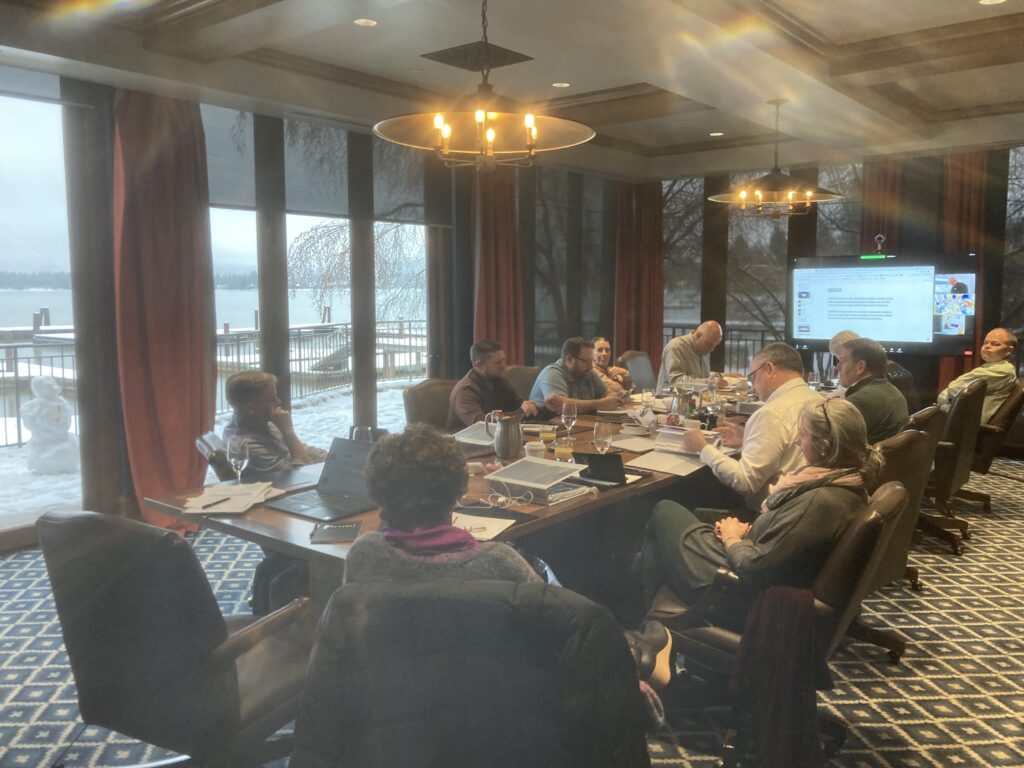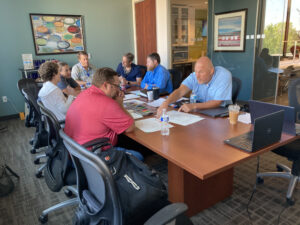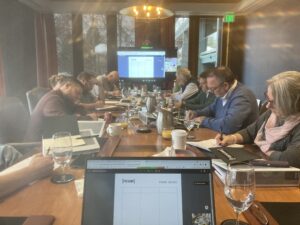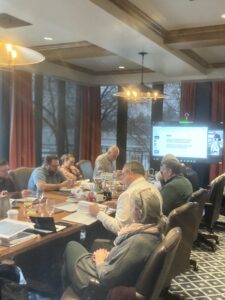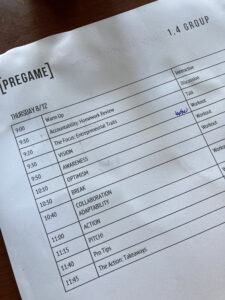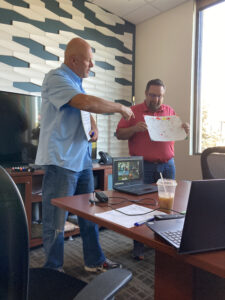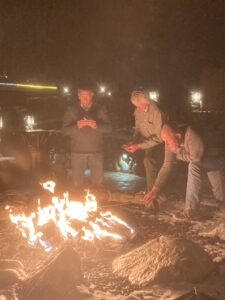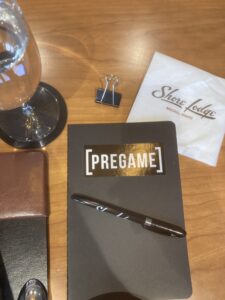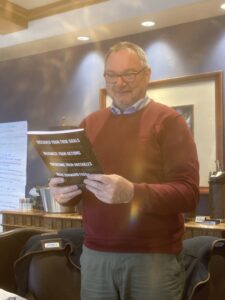After nearly 30 years in business, 1,4Group was integrating a new CEO for the first time since its father & son founders had started the company. Through a lot of hard work by the founders, loyal staff, and fortunate changes in the industry, the company had been thrust into growth mode.
The challenge: how would they catch up with and gain control of their growth?
Their team spent the first year setting their own goals with the incoming CEO, but those goals weren’t met. It was clear that they needed to bring in an objective third party to identify why the goals weren’t achieved. Just as important was for that expert to have chemistry with the team – as a small, family-run business, the friendly culture was central to its values and identity.
CEO Steve Elfering was meeting regularly with founder John Forsythe. “We realized they were trying to solve the business from in the weeds, not up on top of the mountain. Once we took a drone ride up and looked down, things became so much more clear. But we saw that the other managers were far into the weeds. John and I said, ‘How do we get people trained to work on the business, not in the business?’”
A simple Google search of that phrase surfaced Ciara’s article Working On Your Business vs Working In Your Business, which started conversations about how the team might level up its goal game. Pregame designed a custom leadership development series which included a mix of executive coaching, leadership workshops, and strategic planning at a week-long retreat with the senior management team of all four companies in the 1,4Group portfolio.
One year later, Ciara chatted with Steve about their experience with Pregame, how it’s affected their performance, and what a successful training relationship means for team culture.
Our first workshop, In the Business vs On the Business, was last August in Meridian. Talk to me about what your expectations were going in; how you felt about bringing everybody together as an executive team for the first time to their first professional development workshop.
I think there was a lot of positive anxiety because so many people hadn’t been through even a consulting session before. So they knew they would be asked to get out of their comfort zone.

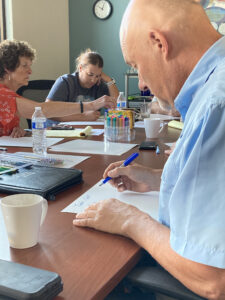 You took us through an exercise about creating a hypothetical business, and we kind of wondered while going through it, “This is embarrassing, this is difficult… Is this silly?” And then when you brought it to the end, we were like “Ohhhhh!” It wasn’t about what the business idea was or if it was silly or not. It was the fact that you forced us – without telling us – to work on the business. And it was fun to watch different people leap forward from that moment. There was a lot of discussion afterward, a lot of aha! moments.
You took us through an exercise about creating a hypothetical business, and we kind of wondered while going through it, “This is embarrassing, this is difficult… Is this silly?” And then when you brought it to the end, we were like “Ohhhhh!” It wasn’t about what the business idea was or if it was silly or not. It was the fact that you forced us – without telling us – to work on the business. And it was fun to watch different people leap forward from that moment. There was a lot of discussion afterward, a lot of aha! moments.
Two weeks later, somebody had spent a lot of time thinking about it and requested a meeting with me to say let’s talk about in and on the business – let’s talk about Ciara’s exercise and how it comes back to our business. So the exercise in and of itself wasn’t so much about the moment of the exercise, but that it got different paradigms and thought processes started.
The next thing we did was some game planning and goal setting. How did you know you needed to do some extra work on the way you set goals?
I’d come from a company that was really big about goals; 5- and 10-year goals in the annual planning. Coming here was a smaller environment and there hadn’t been a lot of goal setting. There was a lot of just elbow grease and getting down and doing it.
Visiting with people, they enjoyed what they were doing but didn’t necessarily know what the long-term vision was. They were anxious about not knowing the ultimate destination or how their work tied in with other departments.
That was the aha moment: okay, we need to get on these goals.
When we did it on our own, I thought, well, this is a time that we’re probably going to learn more by a little bit of failure that won’t be detrimental to the company, but it will be a learning exercise.
When we were getting towards the end of that first year, it became clear that we were missing a lot of goals. “Oh, wait, that goal wasn’t even clear. How do I know if I met it or not?”
I allowed the group some teachable moments to set the stage for bringing in an expert to build us up and teach us the goal process.
It really seemed to propel us light years forward. The group still talks about how much progress we’ve made from year one to year two on goals and understanding them, and their goals are posted on their walls and on desktops. And they understand that I’d better be working on it in May if I’m going to get this done by November.
So you basically teed up a slam dunk for me. (ed note: Ciara acknowledges her mixing of sports metaphors and promises not to do it again.)
I teed it up, but you still had to do a lot of hard work. We wouldn’t have done it without you.
Let’s talk about November. I joined you for the leadership retreat which was a full week of goal setting with your senior management team.
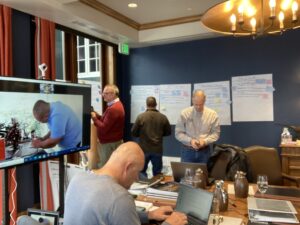 There was a beneficial sense of your presence in the room, that people knew you could help coach them through with the different observations you were going to make. When we would get off course, you would very subtly bring us back, or you would facilitate discussions between two of the teammates.
There was a beneficial sense of your presence in the room, that people knew you could help coach them through with the different observations you were going to make. When we would get off course, you would very subtly bring us back, or you would facilitate discussions between two of the teammates.
But yet you sat around the table as if you were part of the team, so you blended in with the team really well. Rather than presenting goals, you were facilitating the process for all of your teammates.
And then the real key point was at the end when we put our goals on the wall and you followed us around and critiqued each one of the goals so they were properly written. And then facilitating partnership and support between departments.
You wouldn’t have been able to tie it together at the end as well as you did had you not been there for the first three days to understand the road we took to get to that last day. That was important. You really had the chemistry to fit in, just like you were part of the team.
I felt like part of the team! At first I was a little nervous to spend the whole week with you. “Ohhh, that’s a lot of time with clients.” We ended up having dinner together with the whole team every night – it was so much fun, and I think it helped people trust me more and to know that I was there to help them be successful.
I’ve heard several people mention that. Almost immediately you had that sense of trust, that they could talk about virtually anything with you, and they could feel vulnerable in a situation. “I’m admitting my weakness in front of all my teammates because I know she’s creating the atmosphere where it’s safe for me and everybody is going to try to help me.”
This year I’ve been doing less hands-on training with the team and more goal accountability on a quarterly basis. Does that mean everybody learned how to do it?
I think it’s a good sign: people got the skills and they don’t need as much hand holding. Yet everybody still has the ability to set up a one on one meeting with you if they’re feeling they’re off track.
They’re really understanding how it works. And the ability to identify when they’re off track and sometimes how to deal with their teammates when they’re holding them back.
So yes, I think you’ve taught us some really good skills that we’re continually working on.
Are there ways that you’ve seen individual managers change or shift through this work?
It almost was like we transcended from last November’s meeting when you were there. We were in the same room for 8 or 10 hours a day. We had some walks out in the snow and we had dinner, and the team really seemed to come together.
Individually, I’ve seen different people have some aha moments: “Oh! If I let this hat go and hire somebody to take that hat, that will free me up to not be quite as busy. If I let go and I could further grow that skill of working on the business as a senior manager rather than down in it.”
As a CEO, how do you measure the ROI on doing professional training and development? What makes it worth it for you to invest company resources – not just the expense, but everyone’s time?
It’s more of the feel of: are we going in the right direction and do I feel like we could have gotten there without the outside help? There’s not a numerical measurement or metric.
I could say the culture’s been good. I thought we were too aggressive on goals at first, but here we are, we’re chugging through, and everybody is happy about doing it. As we’re going, somebody will set up an action or process that reflects back to a point in time that you taught us something.
It’s been good ROI for us.
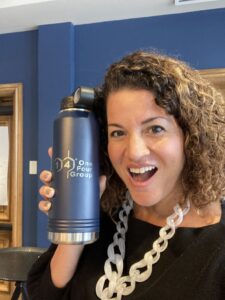 I want to put it in context: even though the company’s been around for years, the leadership change is not just about maintaining continuity. You have a pretty aggressive growth goal.
I want to put it in context: even though the company’s been around for years, the leadership change is not just about maintaining continuity. You have a pretty aggressive growth goal.
There’s already been a fair amount of growth. I would say our growth from two years ago would have been 400%. Meanwhile, our organization processes and systems probably needed 600% growth to catch up.
Anything else you want to share?
I appreciate you; you’ve helped us a ton. We love having you as a teammate.

